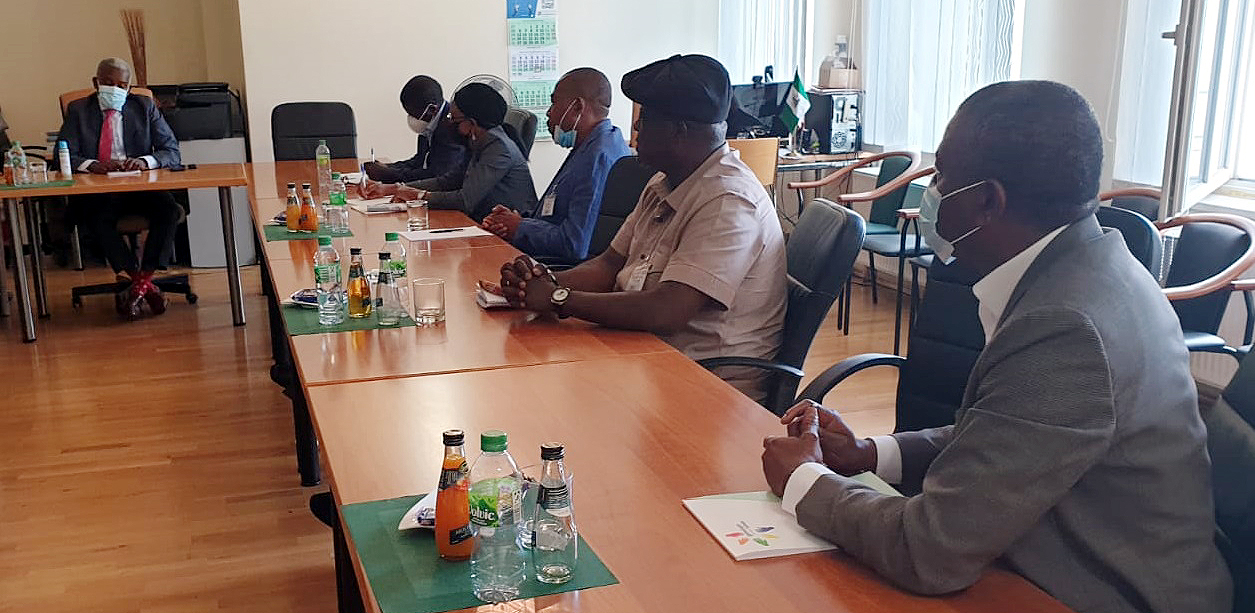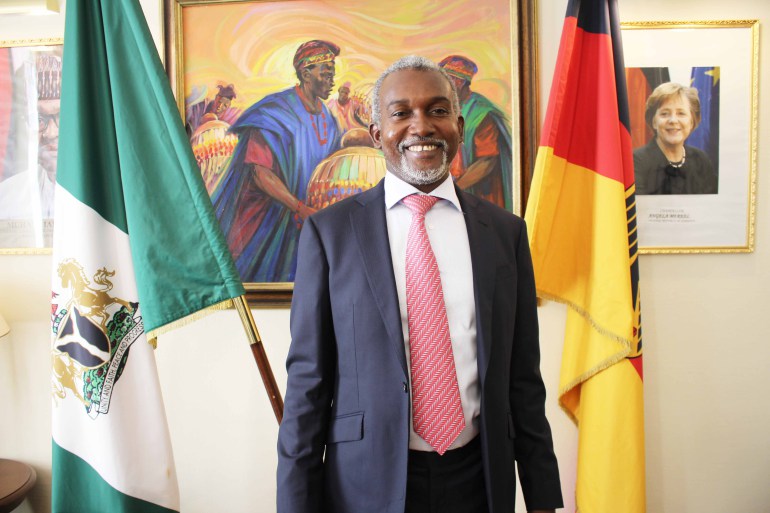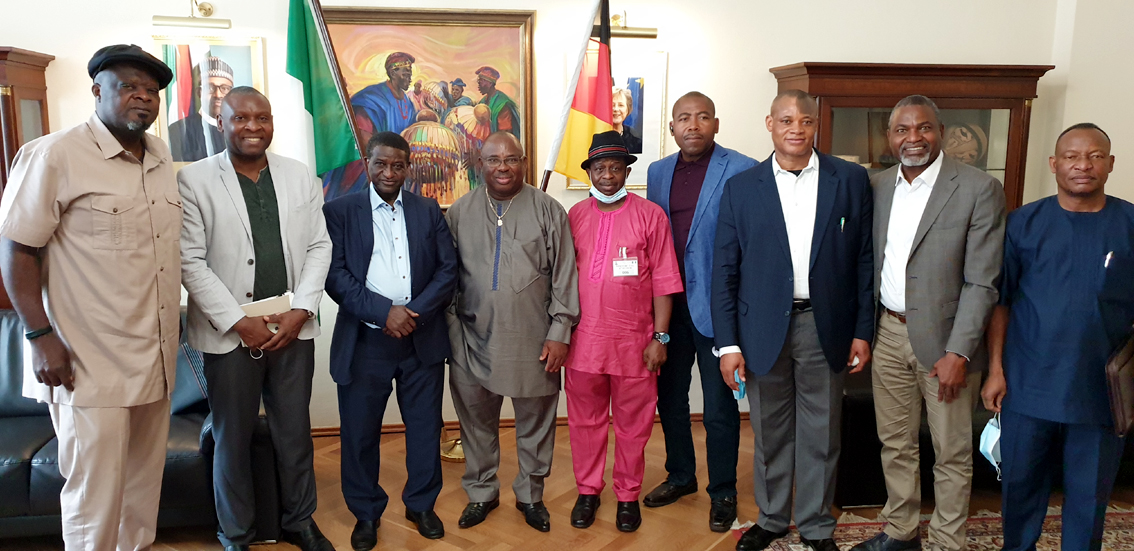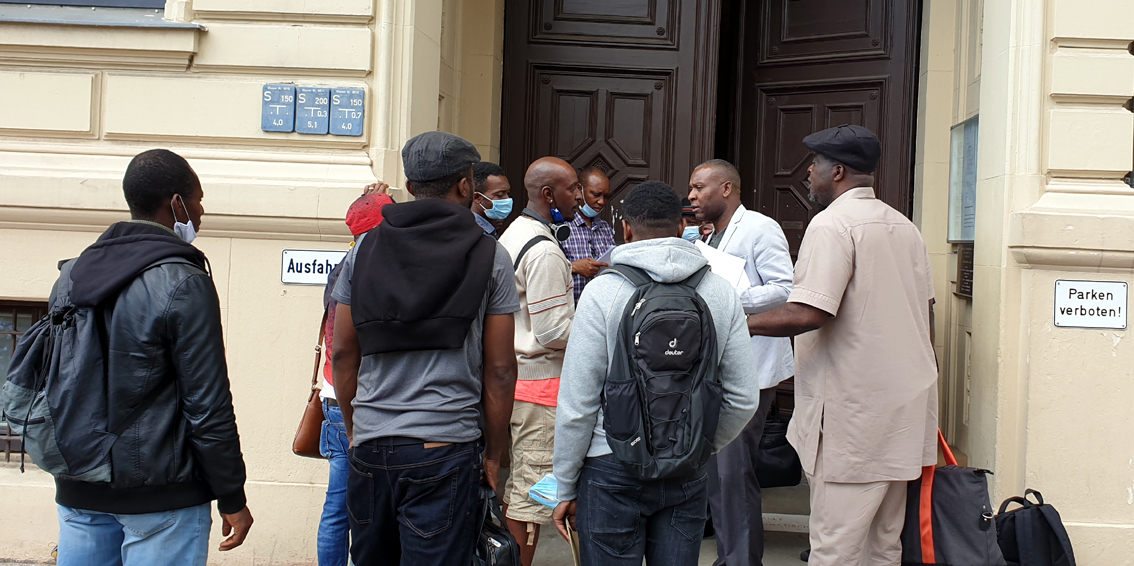At a meeting with representatives of the Nigerian community, Ambassador Tuggar addresses the complaints about service delivery at the Embassy, including difficulties of getting appointments for passport issuance.
The Nigerian Ambassador to Germany, Hon. Yusuf Maitama Tuggar, has revealed that the COVID-19 pandemic was mainly responsible for the difficulties being experienced by Nigerians seeking to renew their passports or apply for the issuance of new ones at the Embassy.
The ambassador made the remarks at a meeting with representatives of the Nigerian community recently in his office in Berlin.
Nigerians in Germany have been complaining bitterly about the difficulties they face while seeking appointment for passport renewal or issuance at the Embassy. The online appointment system often breaks down, many say.

Hon. Tuggar pleaded with Nigerians to exercise patience as there had been a huge backlog of appointments before the pandemic broke out and those who had previously received appointments would have to be served before new applicants are attended to. He expressed confidence that the situation would improve shortly.
The meeting, requested jointly by Nigerian Community Germany (NCG) e.V., Concerned Nigerians in Germany (CNG) e.V. and Nigerians in Diaspora Organisation Germany (NIDOG) e.V., was to bring to the notice of the Ambassador the complaints of Nigerians living in the country.
Chuks Lewis Ehiwario, President of the CNG, said it sometimes takes about one week to be able to log into the online appointment system and when the system opens, there are no open appointments for several weeks. “Many Nigerians have lost their jobs and other opportunities because of their inability to timely renew their passport,” he added.

Hon. Tuggar explained that the new appointment system was introduced because the former one had been compromised by some unscrupulous elements. The new system was therefore created to make life easy for Nigerians, he said.
The Ambassador explained further that he would not like to revert to the old system which “was characterised by touting, corruption and profiteering”.
“Please do not allow yourselves to be used by people who want us to move back to the old system for their selfish purposes,” he added. “The system is new. Please work with us to improve it.”
Hon. Tuggar however assured that cases of emergency would be attended to by the Embassy to prevent Nigerians from encountering difficulties because their passports expired. He advised those affected to send an email to the Embassy.

The Ambassador said the Embassy’s service delivery was also hindered by its limited staff capacity and stock of materials available. “The Embassy lacks the capacity to adequately address the demand for its services and Nigeria does not have the means to expand the capacity at the moment due to the country’s economic situation,” he added.
Hon. Tuggar called on the Nigerian community to work with the Embassy to stamp out corruption in its service delivery. “If you learn of any cases of corruption, please let me know,” he pleaded. “Any official found involved in racketeering at the Embassy will be sent back home,” the Ambassador vowed.
Muyiwa Odunubi, Immigration Attaché II, revealed that the online system is programmed to shut down after allotting appointment slots to applicants for a maximum period of 90 days. “We programme the software such that it cannot allot appointments beyond a period of three months,” Mr Odunubi said.
He further explained that the system could only process 25 applications per day. “The problem now has to do with the backlog of people due to the pandemic.”
READ ALSO Government approves 10-year validity period for Nigerian passports
Earlier, David Peters, President of the Nigerian Community Germany (NCG) e.V., thanked the Ambassador for meeting with the delegation, and he reiterated the willingness of the Nigerian community to co-operate with the Embassy in the discharge of its duties.
Mr Peters however faulted the communication policy of the Embassy because Nigerians in Germany were left in the dark about important issues concerning them. He cited the example of visa issuance, which had been outsourced to a private company since last year.
“Nigerian organisations only learnt of that policy on the Embassy’s website,” he bemoaned. “There was no direct communication with the organisations in the Nigerian community who should have been properly informed.”
The Ambassador, in response, said the outsourcing of visa issuance was directed by the Federal Government and the Embassy only implemented it.

The delegation also raised the issue of rumours circulating in the community that some passport applicants pay bribes to get appointment.
Alhaji Mohammed Bello Musa Anka, Minister in charge of the Consular & Immigration Section, in his intervention, said some leaders of Nigerian organisations often call the Embassy on behalf of desperate passport applicants and the Embassy seeks to help in such situations by giving out emergency appointments without knowing that some of these officials had collected money from the persons they were seeking to help.
READ ALSO Don’t bribe any Nigerian embassy staff, Minister Mohammed Anka warns
“People should come out and say who collected money from them,” Anka said. He blamed those giving out money for appointments for encouraging corruption.
Odunubi also added that some unscrupulous Nigerians book several appointment slots which they sell to their fellow Nigerians, claiming that the money is to be paid to Embassy officials for facilitating the appointment.
The delegation called for a change of the booking system so that it could issue appointments beyond 90 days.
Peters also talked about other issues, including the situation of Nigerians in German prisons, women whose children have been taken away from them by the authorities, the fate of Nigerians facing deportation and the practice of German authorities sending documents for verification/legalisation to Nigeria instead of to the country’s Embassy in Germany, a process that costs those affected up to 650 euros.
READ ALSO Nigeria begins identification number issuance to citizens in Germany, UK, US, others
The Ambassador said it’s the prerogative of the German authorities to choose the process of verifying or legalising Nigerian documents and as such the Embassy had no influence on the policy.
On the issue of women whose children had been taken from them, Mrs Callista Adaego Nwosu, Counsellor/Political, said the Embassy could not intervene as it was an issue that has to be dealt with by the community.
The delegation also inquired from the Ambassador when the Embassy would begin to issue passports with 10-year validity as this would go a long way to reduce the pressure on the mission. Hon Tuggar said the machine for its production had not yet been installed at the Embassy.
In his closing remarks, Ambassador Tuggar asked the community to be specific in its complaints as that would make addressing them easy. He called for suggestions from the visiting organisations on how the Embassy could improve its service delivery.
Femi Awoniyi
Members of the delegation who met the ambassador are David Peters, President of NCG, Nnamdi Achonu (Vice President of NCG), Mazi Obiora Nweke, (General Secretary of NCG and PRO of NIDOG), Yusuf Baba Gar (Ass. General Secretary of NCG), Daniel Otuali (PRO, NCG), Chuks Lewis Ehiwario (President, CNG) and Femi Awoniyi, (General Secretary, NIDOG).
The meeting was also attended by Alhaji Mohammed Bello Musa Anka, Minister in charge of the Consular & Immigration Section at the embassy, Mr Imo Asuquo Ebong (Immigration Attaché I), Mr Muyiwa Odunubi (Immigration Attaché II) and Mrs Callista Adaego Nwosu (Counsellor/Political).
——-
Useful links
Embassy of Nigeria, Germany
https://nigeriaembassygermany.org/
Nigerian Community Germany e.V.
http://nigeriancommunitygermany.com/
Nigerians in Diaspora Organisation Germany e.V.
http://www.nidogermany.de/
Concerned Nigerians in Germany e.V.
https://concerned-nigerians.org/
 THE AFRICAN COURIER. Reporting Africa and its Diaspora! The African Courier is an international magazine published in Germany to report on Africa and the Diaspora African experience. The first issue of the bimonthly magazine appeared on the newsstands on 15 February 1998. The African Courier is a communication forum for European-African political, economic and cultural exchanges, and a voice for Africa in Europe.
THE AFRICAN COURIER. Reporting Africa and its Diaspora! The African Courier is an international magazine published in Germany to report on Africa and the Diaspora African experience. The first issue of the bimonthly magazine appeared on the newsstands on 15 February 1998. The African Courier is a communication forum for European-African political, economic and cultural exchanges, and a voice for Africa in Europe.


































